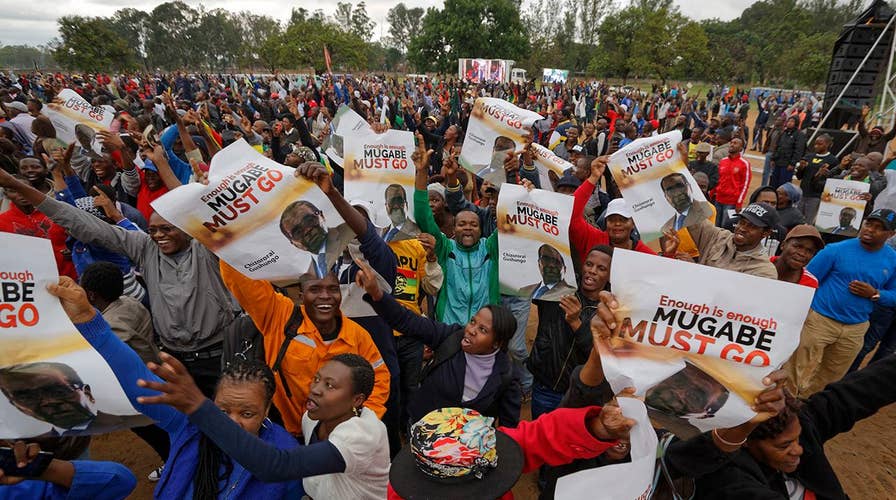Thousands rally in Zimbabwe against President Mugabe
Kitty Logan reports on the historic demonstrations.
On Sunday, Zimbabwe’s governing party moved to oust Robert Mugabe as its leader, four days after the military arrested him on charges of corruption and effectively ended his authoritarian rule of nearly four decades.
Although the Trump administration has taken a largely “hands-off” approach to Zimbabwe, President Trump now has the opportunity to exhibit leadership by denouncing Mugabe’s authoritarian regime and calling on Zimbabwe’s military and political leaders to establish a government characterized by the rule of law and respect for human rights.
Why should the American President put Zimbabwe at the forefront of his agenda?
For two reasons.
First, Mugabe’s regime represents one of the most brutal authoritarian regimes in modern history.
Second, Mugabe’s ouster in no way ensures that Zimbabwe’s situation will improve.
Although he began his rule as a responsible revolutionary, Mugabe morphed into a cruel dictator who was willing to slaughter his own people, including friends and associates. Mugabe was in fact so proud of his brutal record that in 2000 he boasted of having a “degree in violence.”
A Zimbabwe government that respects human rights and the rule of law is good for Zimbabwe and good for the world.
Martin Meredith, a renowned historian of Africa, wrote about Mugabe’s move from moderation to an obsession with power and control in his book “Mugabe: Power, Plunder, and the Struggle for Zimbabwe’s Future.”
“Mugabe’s ultimate objective, Meredith writes, “was to destroy all opposition to his regime. Determined to remain in power, he used all the resources of the government to attack his opponents, sanctioning murder, torture, and lawlessness of every kind.” He was surrounded by sycophants and therefore knew few restraints. He attacked not only Zimbabwe’s whites (who he claimed were causing the downfall of the country) but also members of his own tribe, including even his lieutenants and former friends.
One of the best examples of his brutality was the formation of the “5th Brigade,” a police force trained by the North Koreans and commissioned to bring terror upon his rivals that killed more than 10,000 civilians in addition to arresting, detaining, and torturing thousands of others.
Mugabe also ushered in an era of unprecedented corruption, marked by a widening gap between the rich (Mugabe’s party elite and cronies) and the poor (the rest of the country), a failure to manage the public sector, and the battering of any opposition. “The cost of this strategy,” writes Meredith, “has been enormous. Zimbabwe has been reduced to a bankrupt and impoverished state, threatened by economic collapse and catastrophic food shortages.”
And it doesn’t look to improve even if the 93-year-old dictator steps down. As the New York Times reported Thursday, Emmerson Mnangagwa, the Zimbabwe’s vice president and former intelligence chief known as “The Crocodile” for his ability to “strike at the appropriate time,” is a leading contender to step into Mugabe’s shoes.
Will Mugabe’s deposition set the stage for a new era in which Zimbabwe’s leaders respect human rights? Or will the successor government perpetuate the era of authoritarian rule and human rights violations generated by Mugabe?
America should use every diplomatic and economic tool at its disposal to help influence the outcome. A Zimbabwe government that respects human rights and the rule of law is good for Zimbabwe and good for the world.
For this reason, President Trump should capitalize on this crucial opportunity. He should use every diplomatic and economic means at his disposal to influence Zimbabwe’s military and political leaders to establish order, hold free elections, and construct a new political arrangement that ensures individual liberties and secures human rights.
In doing so, the president has the opportunity not only to help the citizens of Zimbabwe who have suffered far too long at the hands of a brutal dictator, but also to make a clear statement about America’s continued commitment to moral leadership in the face of immoral regimes.





















